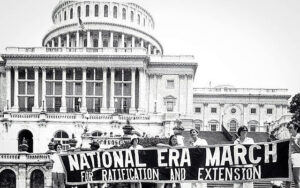
Photo by Joan Roth
When I was growing up in New York, advocacy for the federal Equal Rights Amendment (ERA) was a critical focus of the women’s movement, and was personal in my family — and to my own growth and trajectory as a social justice advocate.
Now, as a New York State ERA will be up for voter approval in November, it is worrisome that so few are aware of it and the opportunity it presents to prevent the diminishment of women’s rights here, and more broadly throughout the country.
As CEO of Elluminate, I am around many young, college-educated women. I am also a mom of two young adult daughters. I recently asked a number of them if they know what the ERA is.
Some said they hadn’t heard of it. Others could not tell me what the initials stand for. My daughter, Shoshana, expressed another common sentiment: “A few years ago, I would have asked why we need an ERA as women have gained equal rights in so many spheres of life, but with the roll back of Roe v. Wade and the Project 2025 platform, I now see how quickly those rights can be taken away.”
The ERA has great meaning to me as I proudly watched my mother, a photographer, lending her voice at marches in NYC, Albany and Washington in favor of passage, and being part of the widespread mobilization of supporters and allies seeking to amend the US Constitution and guarantee equality of rights under the law for all people regardless of sex.
In 1972, that movement met with success when the New York State Legislature ratified the federal ERA, becoming number 35 of the 38 states needed for the amendment’s adoption. But, all these years later, the ERA has not become national law in the US and is still mired in legal challenges, despite the necessary number of state approvals.
Locally, the New York State constitution does not require equal rights for women. To rectify this, New York legislators have put a state constitutional ERA on the November ballot to secure and solidify women’s rights, empowerment and advancement.
If New York amends its constitution to prohibit discrimination on the basis of sex, it would become the 28th state to have an ERA protecting women’s rights. It would also protect reproductive rights, defined to include “pregnancy, pregnancy outcomes and reproductive healthcare and autonomy.” If passed, New York would be the first state to explicitly protect reproductive rights in an ERA.
The ERA will appear as Proposition 1 on the flip side of the 2024 New York State ballot and will add expansive protections to the state constitution, guarding against discrimination based not only on sex, but also ethnicity, national origin, age, and disability.
The future of women’s equality in America is at the center of the 2024 US elections, with party control of the White House and the Congress at stake. And while it is easy to consider these races to be paramount, as social justice-inspired leaders and activists and voters, we cannot forget that our states, cities and localities are also critical fronts for gender equality.
If you’re not aware of Proposition 1, you’re not alone. With press coverage focused so heavily on the national elections, there’s little bandwidth to spare, leaving a majority of New York State voters uninformed.
It is no small matter that the domino effect from its passage will be highly significant and meaningful, altering public discourse and opinions, and creating further momentum for federal adaptation.
For example, in the 1970s alone, when multiple states were considering — and many were passing — the federal ERA, public conversation was highly audible at a time of great social change.
Women were breaking barriers in the policy arena and in many spheres of society, the UN designated 1975 as International Women’s Year, and four years later adopted the Convention on the Elimination of All Forms of Discrimination Against Women. The UN Decade for Women began and reproductive rights under Roe v. Wade became the law of the land.
This past summer, Elluminate, an organization that empowers Jewish women leaders working for equity and justice, organized an ERA briefing featuring Marcy Syms, co-founder, and Ting Ting Cheng, director, of the ERA Project at Columbia Law School. It became clear that so many women leaders and young people do not know about the ERA or of it being on the November ballot.
It is imperative that we take this time to educate, activate and mobilize our daughters, sons, and voters in New York about the state ERA and the unprecedented opportunity it presents.
We need to ensure they are registered to vote, we need to hold parlor meetings on the topic, we need to create awareness about the ERA in our networks in-person and on social media, and we need to support organizations working for women’s empowerment.
We have a great model. During the Virginia vote for the federal ERA in 2018, young women created Generation Ratify, taking their movement to Washington DC in 2023 to advocate for the ERA to become codified into national law.
The short time remaining between now and November is critical. It’s important for us to have intentional intergenerational conversations to create a shared vision of a world we want to live in and lay out steps we can take toward getting there.
I know the power of these conversations because they are the conversations my own mother had with me. It’s our responsibility to act with integrity by seizing this moment and securing the rights we have achieved over the past 50 years in New York and for the nation — and to not look back.
See full article here.
